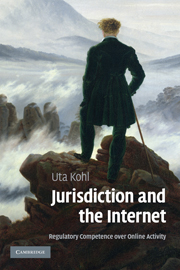Book contents
- Frontmatter
- Contents
- Preface and acknowledgments
- Table of cases
- Table of statutes, regulations, directives and treaties
- 1 Jurisdiction and the Internet
- 2 Law: too lethargic for the online era?
- 3 The tipping point in law
- 4 Many destinations but no map
- 5 The solution: only the country of origin?
- 6 The lack of enforcement power: a curse or a blessing?
- 7 A ‘simple’ choice: more global law or a less global Internet
- Bibliography
- Index
7 - A ‘simple’ choice: more global law or a less global Internet
Published online by Cambridge University Press: 18 July 2009
- Frontmatter
- Contents
- Preface and acknowledgments
- Table of cases
- Table of statutes, regulations, directives and treaties
- 1 Jurisdiction and the Internet
- 2 Law: too lethargic for the online era?
- 3 The tipping point in law
- 4 Many destinations but no map
- 5 The solution: only the country of origin?
- 6 The lack of enforcement power: a curse or a blessing?
- 7 A ‘simple’ choice: more global law or a less global Internet
- Bibliography
- Index
Summary
The hidden choice
The central question addressed in this book is: how can the transnational Internet be reconciled with national law? The preceding chapters have examined how courts and legislatures of various States have in various legal contexts worked with, rather than against, the national-law paradigm in dealing with transnational online disputes and events. The general picture which emerges is that national law has survived, and can survive, however uncomfortably, the online challenge. The solutions may not be perfect. However, a moderate country-of-destination approach goes quite some way towards striking a compromise between the perceived need of States to protect their local law space, on the one hand, and the need to protect online actors from overregulation and the openness of cyberspace, on the other hand. If in addition States could be persuaded to cooperate more extensively in the enforcement of each other's claims or/and perfect their unilateral enforcement strategies, national law and the transnational Internet are both accommodated, perhaps in an uneasy union, but reconciled in any event. Or are they?
This chapter pulls the cloth from underneath the discussion in the preceding chapters (if indeed it was there) and from the jurisdictional Internet debate more generally, by rejecting the idea that the transnational Internet and national law are reconcilable. They are not; they are logically irreconcilable, and thus practically so. It is impossible to hold onto national law successfully and not compromise the transnational openness of the Internet.
- Type
- Chapter
- Information
- Jurisdiction and the InternetRegulatory Competence over Online Activity, pp. 253 - 290Publisher: Cambridge University PressPrint publication year: 2007



